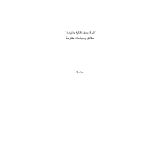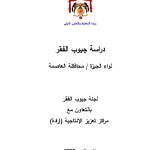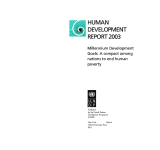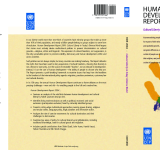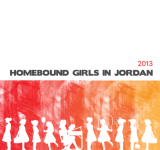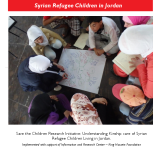inequality
تبحث هذه الورقة في ﻋﺪّﺓ مواضيع ومنها أحكام حق المرأة في الملكية والميراث في الإسلام;; و الإطار القانوني لحق المرأة في الملكية والميراث في الأردن;; وضمانات هذه الحقوق;; إضافة إلى عكس واقع حق المراة في الملكية والميراث في الأردن. ومن ثم عرض النتائج والتوصيات.
يهدف هذا المسح والذي نفذ لأول مرة في الأردن إلى التعرف على أوضاع قطاع العمل غير المنظم في مناطق أمانة عمان الكبرى;; والتعرف على المشاركة الاقتصادية للمراة من خلال الوقوف على أهم الأسباب التي تدفعها للعمل في مثل هذا القطاع. وكما يهدف إلى تعزيز دور المرأة الأردنية في سوق العمل. ومن جهة أخرى يقدم التقرير أهم الخصائص الرئيسية لمجتمع العينة بالاضافة إلى النتائج الأولية الرئيسية للمسح المتعلقة بالمشتغلين.
This report provides an assessment of the Millennium Development Goals;; laid out by the UN Millennium Declaration. The UN Millennium Declaration was adopted in September of 2000 as a commitment on the part of the world's leading nations to reduce poverty;; improve health and promote peace;; human rights;; and environmental sustainability. The Millennium Development Goals are specific;; measurable targets that aim to reduce extreme global poverty by the year 2015. This report analyzes the challenges and barriers to meeting these goals as of 2003;; examining the successes and failures of various nations and the gaps that exist between regions and countries with regards to economic growth and human development. This report then examines the successes and failures of public and private policies with regards to hunger;; health;; water and sanitation;; education;; and environmental sustainability. This report also analyzes the participation of civil society throughout the world and the mobilization of grassroots support for the various human development goals. Finally;; this report presents a number of recommendations on what countries can do to best support these goals.
Accommodating people's growing demands for their inclusion in society;; for respect of their ethnicity;; religion;; and language;; takes more than democracy and equitable growth. Also needed are multicultural policies that recognize differences;; champion diversity and promote cultural freedoms;; so that all people can choose to speak their language;; practice their religion;; and participate in shaping their culture—so that all people can choose to be who they are. In recent years the Human Development Report has argued strongly that this is as much a question of politics as economics—from protecting human rights to deepening democracy. Human development is first and foremost about allowing people to lead the kind of life they choose—and providing them with the tools and opportunities to make those choices. The 2004 Report builds on that analysis;; by carefully examining—and rejecting—claims that cultural differences necessarily lead to social;; economic and political conflict or that inherent cultural rights should supersede political and economic ones. Instead;; it provides a powerful argument for finding ways to “delight in our differences”;; as Archbishop Desmond Tutu has put it. It also offers some concrete ideas on what it means in practice to build and manage the politics of identity and culture in a manner consistent with the bedrock principles of human development.
إن الهدف من التقرير هو التحقق من ظاهرة الفتيات جليسات المنازل في الأردن;; وهن الفتيات اللواتي انسحبن من المدرسة ويبلغن من العمر اقل من 18 سنة سواء كان الانسحاب رغبة منهن أو تم سحبهن من قبل عائلاتهم;; ويقضين أيامهن بالعمل في المنزل. ويهدف هذا التقرير إلى: أولاً فهم الأسباب إلتي أدت إلى حبس هؤلاء الفتيات;; ثانياً إلى تحديد التدخلات الممكنة التي تسمح للفتيات جليسات المنازل الوصول إلى التعليم وتساهم في تعزيز نموهم الاجتماعي. وتم تنفيذ البحث من خلال الاعتماد على منهجية البحث النوعي حيث تم اجراء مقابلات شخصية معمقة مع 46 فتاة جليسة منزل و40 والدة وذلك في أربعة مناطق في الأردن وهي: ماركا;; معان;; المفرق;; والزرقاء;; وكما تم العمل على مراجعة الأدبيات والتشريعات الموجودة والمتعلقة بحقوق الأطفال مع التركيز على قضية عمالة الأطفال.
Throughout history water has confronted humanity with some of its greatest challenges. Water is a source of life and a natural resource that sustains our environments and supports livelihoods – but it is also a source of risk and vulnerability. In the early 21st Century;; prospects for human development are threatened by a deepening global water crisis. Debunking the myth that the crisis is the result of scarcity;; this report argues poverty;; power and inequality are at the heart of the problem.The 2006 Human Development Report continues to frame debates on some of the most pressing challenges facing humanity.
his 2005 Human Development Report takes stock of human development;; including progress towards the MDGs. Looking beyond statistics;; it highlights the human costs of missed targets and broken promises. Extreme inequality between countries and within countries is identified as one of the main barriers to human development—and as a powerful brake on accelerated progress towards the MDGs. The report suggests that the world's governments are faced with a choice. They can start a decade for development with the financial resources;; technology and capacity to end poverty or we could have a human development failure. “Business as usual” will not allow fulfilling the promises and the commitments made in 2000. The cost of this failure will be measured in human lives;; increased inequalities;; violations of human rights and threats to peace.

